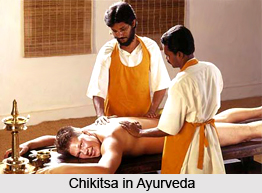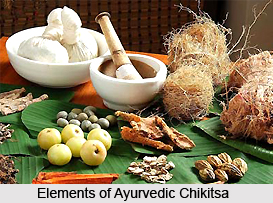Saptwidh Chikitsa is practised mainly for chronic ailments. It refers to the seven types of treatment in Indian Ayurveda. The methods of Saptwidh Chikitsa include Pachan, Deepan, Shudha (hunger), Trisha (thirsty), Vyayam (exercise), Dhupsewan and Vayusewan.
 Pachan: Pachan means digestion. Digestion is very important as a person`s health is directly linked to the health and process of the digestive system. Thus, pachan treatment is done to digest the aam dosha which is a kind of toxin that originates in the body.
Pachan: Pachan means digestion. Digestion is very important as a person`s health is directly linked to the health and process of the digestive system. Thus, pachan treatment is done to digest the aam dosha which is a kind of toxin that originates in the body.
Deepan: To increase the jatheragni commonly known as digestive fire or appetite is known as deepan. It serves to regulate adequate energy intake to maintain metabolic needs.
Shudha: In this method of Saptwidh Chikitsa, one is kept hungry through the method known as shudha.
Trisha: Keeping oneself thirsty or drinking small amount of water is known as trisha in Saptwidh Chikitsa practice.
 Vyayam: Indulgence in physical activities is known as vyayam or exercise. This procedure enhances or maintains physical fitness and overall health and wellness of the patient.
Vyayam: Indulgence in physical activities is known as vyayam or exercise. This procedure enhances or maintains physical fitness and overall health and wellness of the patient.
Dhupsewan: In dhupsewan one is exposed to sunlight as it confers enormous health benefits.
Vayusewan: Vayusewan is the procedure in Saptwidh Chikitsa that involves exposing the body to fresh and pure environment.
The Saptwidh Chikitsa is an important method of Ayurvedic treatment in India. This form of Ayurvedic Treatment helps to cure many body ailments naturally and without any side effects.
This article is a stub. You can enrich by adding more information to it. Send your Write Up to content@indianetzone.com





